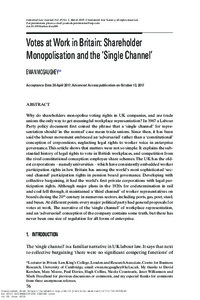Votes at work in Britain: shareholder monopolisation and the ‘single channel'

2018
47
1
March
76-106
labour law ; shareholder ; workers representation ; trade union
Law
http://dx.doi.org/10.1093/indlaw/dwx008
English
"Why do shareholders monopolise voting rights in UK companies, and are trade unions the only way to get meaningful workplace representation? In 1967 a Labour Party policy document first coined the phrase that a ‘single channel' for representation should ‘in the normal' case mean trade unions. Since then, it has been said the labour movement embraced an ‘adversarial' rather than a ‘constitutional' conception of corporations, neglecting legal rights to worker voice in enterprise governance. This article shows that matters were not so simple. It explains the substantial history of legal rights to vote in British workplaces, and competition from the rival constitutional conception: employee share schemes. The UK has the oldest corporations – namely universities – which have consistently embedded worker participation rights in law. Britain has among the world's most sophisticated ‘second channel' participation rights in pension board governance. Developing with collective bargaining, it had the world's first private corporations with legal participation rights. Although major plans in the 1920s for codetermination in rail and coal fell through, it maintained a ‘third channel' of worker representatives on boards during the 20th century in numerous sectors, including ports, gas, post, steel, and buses. At different points every major political party had general proposals for votes at work. The narrative of the ‘single channel' of workplace representation, and an ‘adversarial' conception of the company contains some truth, but there has never been one size of regulation for all forms of enterprise. "
Digital
The ETUI is co-funded by the European Union. Views and opinions expressed are however those of the author(s) only and do not necessarily reflect those of the European Union or the ETUI.